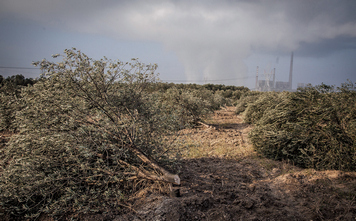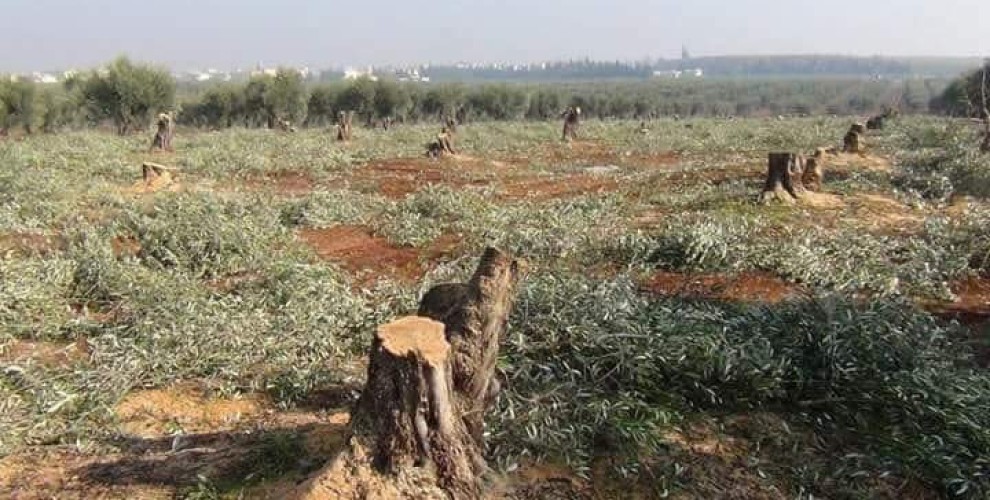- hot-spots
- deforestation
- Turkey
- Coal plant on olive fields in Soma

Problems
The value of olives in Turkey
In Turkey, on the eastern shores of the Mediterranean, the olive is ubiquitous. “It is the most basic food item that you can find in every single household that is consumed by every person, every single day,” explains Nejat Dinç of Greenpeace Turkey. “It’s a very symbolic fruit.” Turkey is the world’s second-largest producer of table olives and the fourth-largest producer of olive oil. UNESCO even protects the Mediterranean diet as a cultural heritage, including the role of olives and their oil.
Coal plant on olive fields in Soma
Olives are also central to people’s lives in the Turkish village of Yırca. It is there that the Kolin Group of Companies planned to build a coal power plant on an olive grove and brought to the fore a legislative fight to legalize the taking of land for power plants across the country. Greenpeace Turkey partnered with villagers to organize community power and protect, then repair, olive groves in Yirca and elsewhere. Greenpeace saw various successes, including a legal stay against the coal project led by Greenpeace lawyer Deniz Bayram. Kolin’s tactics changed later, however. Greenpeace and its partners watched over the olive grove day and night from a watchtower they erected. Then Kolin’s bulldozers rolled in. Villagers stood in front of the hulking machines to stop them from progressing deeper into the grove. Destroying only thirteen trees, the machines were turned back. This initial victory, however, did not stop Kolin. Later, bulldozers returned with a private security force. The vigil turned into a skirmish amongst the villagers that led to arrests. Six thousand trees were cut down.
An issue of national importance
This unplanned moment turned the local Yirki movement into a national problem. Scenes of villagers defending the national symbol, the olive tree, from bulldozers and private security forced Kolin, notoriously impersonal, to go public. That company even tried to hire a public relations firm. Ironically, one of the firms that Kolin approached was working on this very issue on the part of Greenpeace. Yırca created a flashpoint. What happened in Yırca was seen as an attack on the olive itself, bolstering the national campaign against the governing party’s proposed law to take olive groves. No longer was this a fight between environmental campaigners and developers, but an issue about shared Turkish values. The proposed law was tabled and never brought to a vote. Because of this win, Kolin cannot build the proposed plant in Yırca.
Gallery
2Timelines
2015
April 23
It was announced that the proposed power station would be constructed at a new site somewhere between Türkpiyale and Kayrakaltı, about 15 kilometers away from Yırca. The same article reported that the Kolin Group had been tipped off that the originally proposed construction site would be ruled unsuitable for construction, but had torn down the olive trees anyway. A new EIA is needed for construction at the new site.
2014
November 07
A Turkish court ruled the company's attempt to expropriate the land for the power station was without legal basis, stating that Turkey's national olive grove protection law forbids the company from building at the proposed site. The court also ruled that the decision cannot be appealed under current regulations. Turkish Deputy Prime Minister Bülent Arinç said the country "cannot forsake the environment for the rules of wild capitalism", adding that "while the country needs energy, it also needs the trees."
October 21
Yirca villagers and Greenpeace Mediterranean activists were attacked for trying to prevent the construction of the power station, including the cutting down of 6,000 olive trees.
January 11
The EPDK gave Kolin the preliminary environmental permit for the project; Kolin contracted Chinese company Harbin Power Equipment to build the plant. The project broke ground in March 2014, with Energy Minister Taner Yildiz laying the plant's cornerstone.
2013
July 13
The chairman of Kolin Construction met with local political officials in Soma to discuss the project and move it forward.
January 15
It was announced that the plant would be built on the site of Deniş, a 400-year-old village with 265 residents, which would be relocated as part of the project's cost. Residents expressed anger about the plan.
